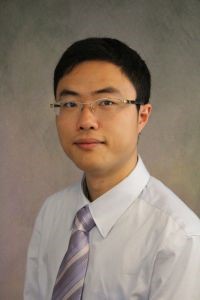Understanding Plug-and-Play ADMM: Convergence, Objective Function, and Generalization

Speaker: Prof. Stanley H. Chan
Affiliation: Purdue University
ABSTRACT: The Plug-and-Play (PnP) ADMM algorithm is a recently developed image restoration method that allows advanced image denoisers to be integrated into physical forward models to yield a provable convergent algorithm. Since its introduction in 2013, PnP ADMM has enabled numerous record-breaking image recovery results in deblurring, inpainting, super-resolution, Poisson denoising, and compressed sensing, etc. However, despite the successful applications and promising results, very little is known about why PnP ADMM performs so well. Fundamentally, the challenge lies in the fact that many of the latest denoisers are not easily expressible as proximal maps, e.g., deep neural networks.
In this talk, I will highlight a few recent progresses made by my group and collaborators. I will discuss three questions. (1) Convergence: Under what conditions of the denoisers will PnP ADMM converge? Answering this question will allow us to comment on the kinds of denoisers we can use and the kinds of convergence we should expect. (2) Objective Function: By plugging in an off-the-shelf denoiser, what does PnP ADMM actually solve? That is, what is the corresponding objective function? This problem will tell us why and when PnP ADMM will perform well, and when PnP ADMM will fail. (3) Generalization: Are we able to generalize PnP ADMM to accommodate multiple agents beyond a single forward model and a single denoiser? This leads to a new concept called consensus equilibrium, which allows us to integrate multiple weak experts to produce an overall strong recovery method. I will illustrate the ideas through examples in image denoising, graph signal processing, turbulence removal and automatic foreground extraction.
BIOGRAPHY: Stanley H. Chan is currently an Assistant Professor in the School of Electrical and Computer Engineering and the Department of Statistics at Purdue University, West Lafayette, IN. He received the B.Eng. degree in Electrical Engineering from the University of Hong Kong in 2007, the M.A. degree in Mathematics from UC San Diego in 2009, and the Ph.D. degree in Electrical Engineering from UC San Diego in 2011. In 2012-2014, he was a postdoctoral research fellow at Harvard. His PhD study and postdoctoral training were supported by the Croucher Foundation PhD Scholarship and postdoctoral Fellowship, two of the most prestigious scholarships in Hong Kong.
Dr. Chan is a recipient of the Best Paper Award of IEEE International Conference on Image Processing 2016 for his work on single photon image sensors. He is also a recipient of multiple education awards including the IEEE Signal Processing Cup Second Prize 2016, Purdue College of Engineering Outstanding Graduate Mentor Award 2016, Eta Kappa Nu Teaching Award 2015, Eta Kappa Nu Outstanding Professor Award 2018, and Purdue Teaching for Tomorrow Fellowship 2018.
Dr. Chan is an Associate Editor of IEEE Transactions on Computational Imaging since 2018, an Associate Editor of OSA Optics Express in 2016-2018, an Elected Member and the subcommittee Chair of the IEEE Signal Processing Society Special Interest Group in Computational Imaging since 2015. He was the co-chair and co-organizer of the computational imaging special session in ICIP 2016, and had served on multiple technical program committees including ICIP, ICASSP, OSA Imaging and Applied Optics Congress, and Midwest Machine Learning Symposium.
For more information, contact Prof. Christina Fragouli (christina.fragouli@ucla.edu)
Date/Time:
Date(s) - Oct 16, 2018
1:00 pm - 2:00 pm
Location:
E-IV Faraday Room #67-124
420 Westwood Plaza - 6th Flr., Los Angeles CA 90095
